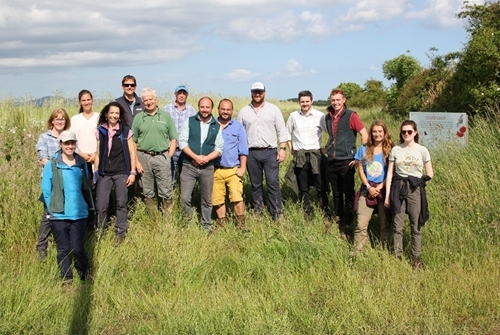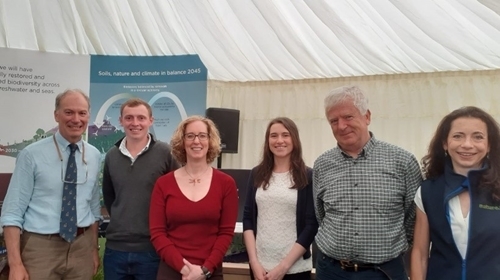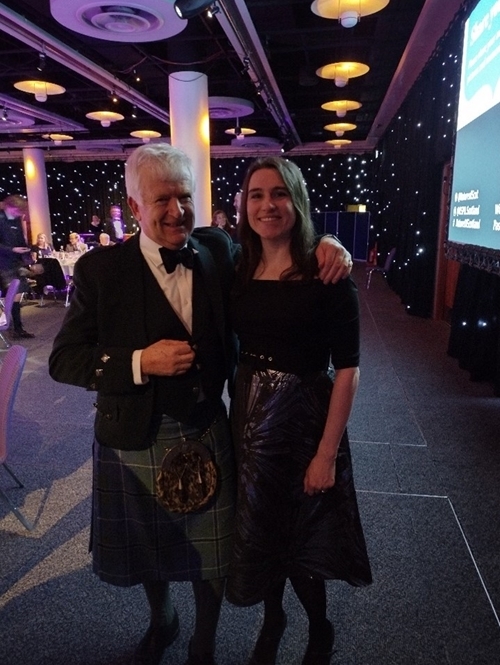Written by Fiona Torrance, Farmland Biodiversity Advisor and PepsiCo FAB project manager.

© Eric Anderson. The PepsiCo FAB project members at the 1st farm walk at Balgonie in June
As with any new venture, a project manager might have high but realistic aspirations for what they would like to achieve in their 1st year. Ensure agreements are signed, get buy-in from the different stakeholders involved, ensure budgets are planned and, if you’re lucky, perhaps run an event or two. As detailed below, it’s fair to say this has not been an average 1st year for the PepsiCo Farming Arable Biodiversity (FAB) project.
The GWCT-managed FAB project, with generous support from Pepsico and key input from NatureScot and Scottish Agronomy, aims to demonstrate how productive agriculture does not need to suffer whilst accommodating biodiversity. The project uses what was learned during the EU Interreg PARTRIDGE project (2016-2023) and is aiming to scale up its approach. To demonstrate the various management strategies and practicalities, Balgonie Estate in Fife hosts several events throughout the year, with the project also helping 5 other pilot farms to prepare for the next round of agri-environment schemes looming in 2025.
The project started on a great footing with the publication of the Draft Agricultural Reform Programme by the Scottish Government in February. This outlined the proposal for the next round of agri-environment schemes in Scotland, something that we had been waiting for keenly! We were delighted to discover that certain types of wild bird seed mix could now be established for 2-3 years, rather than the one year available to farmers in the current AECS scheme. Although this was a direct result of work undertaken by the previous PARTRIDGE project, this was good news for FAB as well, as it meant that other farmers will be able to receive funding for one of the measures we feature, and that there were improved options for biodiversity.
One of the components of the project is communication and in particular, peer-to-peer learning for the farmers and other project members. On 19th June the project held it’s first in-person farm walk for participants at the project demonstration site Balgonie. The day was a great opportunity to talk the farmers through some of the habitat measures that Balgonie has established and discuss options for different habitats that they may want to create. There were also some productive discussions about what they would want from a future AE scheme, and they were shown the first example of the hedge scorecard, something which they would become very familiar with later in the year.

© Scottish Government
Influencing policymakers is also another aim of the project and the team were delighted to secure a meeting with Lorna Slater, Minister for Circular Economy, Green Skills and Biodiversity, at the Royal Highland Show. Although the meeting was brief, we were able to show her a video of what we have achieved at Balgonie, discuss farmer clusters, and inform her about the possibilities of private finance, such as the PepsiCo FAB project. The minister was positive about the project, and we hope she will take up our invitation to visit in 2024.
We also attended several other events throughout the summer. The GWCT Scottish Game Fair at the end of June provided an opportunity to reach a large audience. We’ve also welcomed several visitors to Balgonie, including the agricultural department of the civil service in Scotland and representatives from St Andrews University. We look forward to developing these relationships and working with other stakeholders as future agricultural policy in Scotland becomes clearer.
The end of the year was no quieter, with most of our time spent testing the previously mentioned NatureScot scorecards that will be used in a future scheme. This involved taking the participating farmers through the hedge and arable field scorecards and getting feedback on the complexity, practicalities, and nuances of the questions and how the app worked. Despite the poor weather, the farmers involved generally welcomed the process and a report was provided to NatureScot with our findings.
2023 had already proved to be a great first year for the project. However, in September we found out that Balgonie had been shortlisted for the RSPB Nature of Scotland Awards in the Food and Farming category. Although Balgonie did not win, it was significant that the work we have been doing was recognised in this way and it has motivated the team to continue to work in the future.

Balgonie farm manager John Drysdale and FAB project manager Fiona Torrance at the Nature of Scotland Awards.
It’s fair to say that in the first year, the PepsiCo FAB project has managed to achieve much more than we expected, and we hope to use this as a springboard for 2024. Keep an eye out for future posts to see what we get up to!